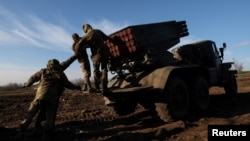Russian President Vladimir Putin said Wednesday he expects a long war in Ukraine, but that he saw "no sense" in mobilizing additional soldiers at this point.
Putin told a televised meeting of the Kremlin’s Human Rights Council — a loyal group of journalists, activists and public figures — that Russia would continue to "defend ourselves with all the means at our disposal" in Ukraine. He contended that Russia was seen in the West as "a second-class country that has no right to exist at all."
"As for the duration of the special military operation, well, of course, this can be a long process," Putin said, using his preferred term for his war against Ukraine, now in its 10th month.
But he said there was no need for a second mobilization of more soldiers, after a call-up of at least 300,000 reservists in September and October, an order that shocked many Russians. Thousands of men, fearful of being sent to the front lines to fight against Ukraine, fled Russia, driving on clogged roads out of the country if they could, or paying sometimes exorbitant fares to board whatever flights they could get bound for other countries.
Putin said of those called up, 150,000 are now deployed in Ukraine, with 77,000 in combat units and the remainder performing defensive functions. The other 150,000 are still at training centers, he said.
"Under these conditions, talk about any additional mobilization measures simply makes no sense," he said.
As he has done in the past in discussing the war in Ukraine, Putin said the risk of a nuclear war was growing but that Russia would not threaten to recklessly use such weapons.
"We haven't gone mad, we realize what nuclear weapons are," Putin said. "We have these means in more advanced and modern form than any other nuclear country, that's an obvious fact. But we aren't about to run around the world brandishing this weapon like a razor."
U.S. State Department spokesman Ned Price, when asked about Putin's comments, would not reply directly but said, "We think any loose talk of nuclear weapons is absolutely irresponsible."
Price said nuclear powers around the world since the Cold War, including China, India, the United States and Russia itself, have been clear that "a nuclear war is something that must never be fought and can never be won."
"We think any other rhetoric — whether it is nuclear saber-rattling or even raising the specter of the use of tactical nuclear weapons — is something that is irresponsible," Price said. "It is dangerous, and it goes against the spirit of that statement that has been at the core of the nuclear nonproliferation regime since the Cold War."
German Chancellor Olaf Scholz said in an interview published Thursday that international pressure on Russia has lessened the risk of nuclear weapons being used in the Ukraine conflict.
"One thing has changed for the time being: Russia has stopped threatening to use nuclear weapons. In response to the international community marking a red line," Scholz said in the interview with Germany's Funke media group.
Asked whether the threat of a nuclear escalation had been averted, Scholz replied: "For the time being, we have put a stop to it."
This week, Russia sustained new losses, with drone attacks on airbases and other facilities hundreds of kilometers inside Russia and in regions near the Ukrainian border. The Kyiv government has not directly acknowledged it carried out the attacks but taunted Moscow about the vulnerability of its air defenses.
U.S. National Security Council spokesman John Kirby said Wednesday the United States has expressed its concerns to Ukraine about any expansion of the war with Russia but respects its sovereignty in deciding how to use weapons supplied by the U.S. and its Western allies.
"We have been consistent on our concerns over escalation," Kirby said and noted he had "not encouraged" the apparent Ukrainian drone strikes on two airbases deep inside Russia on Monday.
He said the principle behind the Western support for Ukraine was one of sovereignty, though, and "unlike the Russians, we respect Ukrainian sovereignty."
"When we give them a weapons system, it belongs to them," Kirby said. "Where they use it, how they use it, how much ammunition they use to use that system, those are Ukrainian decisions, and we respect that."
Putin, in his Kremlin comments, said he has no regrets about launching the most expansive war in Europe since World War II. Initially, Russia strategized for a quick takeover of Ukraine and capture of the capital, Kyiv. But Ukrainians repelled the attacks then, and in recent months the fighting has been centered in eastern and southern Ukraine, where Russia most recently retreated from the key regional capital of Kherson.
Still, Putin said Russia had become geographically bigger by annexing Ukrainian territory, internationally disputed claims he made in September that four Ukrainian provinces are now part of Russia.
"This is a significant result," Putin said.
Some material in this report came from Reuters and Agence France-Presse.






